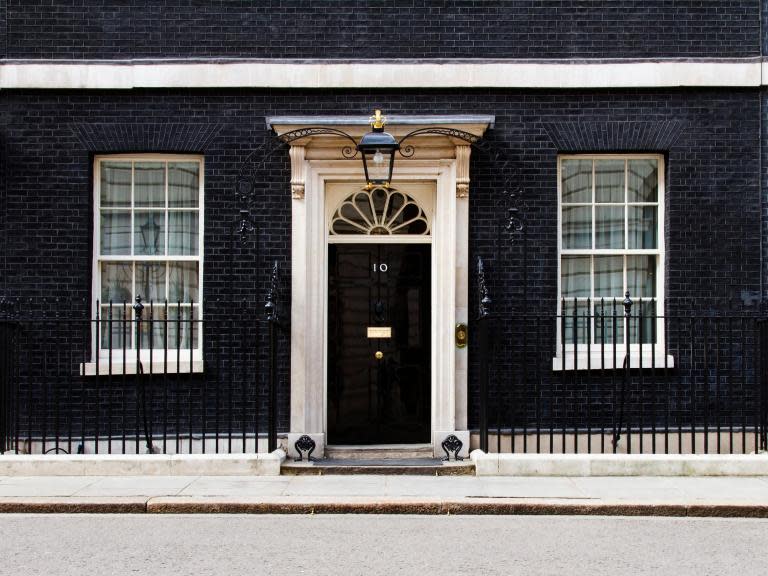Tory leadership race: Open warfare as Hammond tells no-deal Brexit candidates they will be toppled
The race to be the next prime minister has descended into open warfare after the chancellor threatened to join fellow Tories in toppling any leader pursuing a no-deal Brexit.
Philip Hammond’s extraordinary intervention came after Dominic Raab predicted MPs would fail to stop him taking the UK out of the EU without a deal on Halloween night, if he won the contest.
Rival candidate Rory Stewart – who also hinted at joining a no-confidence vote against his own government to block no deal – warned Brexiteers it would ruin Britain’s “400-year reputation” for economic competence.
The clashes overshadowed Michael Gove’s entry into the race as potentially the biggest threat to Boris Johnson’s march to power, in a repeat of the bitter 2016 battle that derailed his last campaign.
“I believe I’m ready to unite the Conservative and Unionist Party, ready to deliver Brexit, and ready to lead this great country,” the environment secretary said.
Mr Gove will face intense questions about his stance on the contest’s key controversy – whether the winner is ready to crash out of the EU in October, even if that means defying the will of the Commons.
Mr Raab sought to outflank Mr Johnson by arguing MPs would fail to repeat their success, under Theresa May, in passing a law to force a request to extend the Article 50 deadline.
“It’s very difficult for parliament now to legislate against a no deal, or in favour of a further extension, unless a resolute prime minister is willing to acquiesce in that – and I would not,” he insisted.
Shami Chakrabarti, Labour’s shadow attorney general, described the comments as “terrifying”, adding: “It will be terrifying for a lot of viewers at home.”
Mr Hammond then refused – three times – to rule out joining the no-confidence vote that Labour has vowed to table if a hardline Brexiteer reaches No 10.
The chancellor said any new leader trying to “push through a no-deal exit on 31 October” would immediately face the prospect of having to “leave office”.
He described support for a no confidence motion as “hypothetical”, but added: “I don’t want to start now having to contemplate such a course of action.”
Pressed again, on the BBC’s Andrew Marr Show, Mr Hammond said: “It would challenge not just me, but many of our colleagues, and I hope we never get to that position.”
Mr Stewart, the international development secretary, tweeted: “A no-deal Brexit would in a single day undermine 400 years of our reputation for economic stability and competence.”
On another day of huge drama, even before the race officially gets under way:
* Jeremy Hunt, the foreign secretary, led an early list for the number of backers among Tory MPs with 28, ahead of Mr Gove (23), Mr Johnson (22) and Mr Raab (19).
* Mr Hammond’s parliamentary aide, Huw Merriman, described a Final Say referendum to break the gridlock as “inevitable”.
* Andrea Leadsom, the former Commons leader, confirmed her candidature, vowing: “In order to succeed in a negotiation, you have to be prepared to leave without a deal.”
* Esther McVey, the ex-work and pensions secretary, also insisted 31 October would be Brexit day, saying: “We are coming out then – and if that means without a deal then that’s what it means.”
* David Gauke, the justice secretary, warned any would-be leader that a general election before Brexit was resolved would “put Jeremy Corbyn in No 10”.
* Tory organisers warned it could take until 28 June to whittle down the long list of candidates to just two, before the final choice is made by members – a week longer than expected.
Mr Raab’s comments followed the Institute for Government’s verdict that it will be “a near impossible task for MPs to stop a prime minister who is determined to leave the EU without a deal”.
The Commons was able to pass a law to block no deal when Ms May threatened it, by passing a motion when her Brexit deal was put before MPs.
But if, as expected, the EU refuses to negotiate new terms with the incoming prime minister, the Commons could be shut out of the process in the countdown to Halloween.
However, the new prime minister will be challenged to prove that they have a Commons majority within days of taking office, in late July.
Following defections to Change UK, the working majority of the Conservative-Democratic Unionist Party alliance is just six – meaning only four Tories would need to switch sides for a no confidence vote to succeed.
If the new leader failed at the hurdle, and no alternative government is confirmed by the Commons within 14 days, there would be a general election.

 Yahoo News
Yahoo News 

